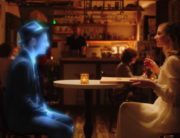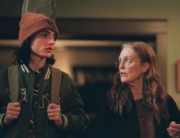Comparable to It Follows, A Ghost Story, and It Comes at Night— to name a few films dubbed by The Guardian in the “post-horror” category—Robert Mockler’s feature debut Like Me can be similarly placed in such a division. However, unlike those films, which deconstruct the tropes and stereotypes of horror, Like Me offers a highly kaleidoscopic twist in a well-worn genre of filmmaking.
Mockler imbues his lead character, Kiya (Addison Timlin), with an addiction to social media, as well as psychotic tendencies, resulting in a formidable female lead. After filming herself on her smartphone holding a convenience store cashier at gunpoint, Kiya proceeds to go on a junk-food crazed criminal viral spree. The robbery is an Internet sensation. The movie rejects the premise of “the final girl” in slasher films and speaks to a society constantly consumed with technology and its disturbing repercussions.
The sensory and evocative, experimental images are filled with consumptive sequences of Kiya’s mouth grotesquely eating (and vomiting) pizza, sweets, and other such junk food, all of which place viewers into her peculiar psyche and her eccentric online profile. After the footage of the prank robbery goes viral, Kiya becomes consumed by adoring fans and the public outcries from critics on online publications, particularly by Burt Walden (Ian Nelson), who punitively condemns her footage. The attention only fuels her craving for more notoriety. Underlying the gratification and constant consumption that thrives on the darker side of the web, Kiya’s inadvertent video is a modern extension of fast food: quick and easily digested.
In the present moment, it is hard not to see the thematic values that are fundamental to the film as echoing those on Netflix’s Black Mirror. The wonder which initially greeted technology in the 1990s and early 2000s has slowly shifted towards a tangible tension that is now being discussed in all forms of art. Such feelings are reminiscent of Big Brother in the novel Nineteen Eighty-Four. On another hand, the film channels Kubrick’s A Clockwork Orange, another dystopian masterpiece like Orwell’s novel, in cinematographer James Siewert’s work. Mockler and Siewert are not afraid to express their central character through the vice of vivid colors and wide lenses to accentuate these Kubrickian and Orwellian scenes. In a low-angle shot of Kiya swinging on a hammock under a blood red ceiling, the masterful filmmaker is evoked.
As Kiya, Addison Timlin offers a riveting take on a media-obsessed millennial, exhibiting qualities of manipulation and deception. The character channels David Cronenberg’s Videodrome in fulfilling her deepest sexual fantasies through the vice of technology, chiefly in seducing a hotel manager (Larry Fessenden) up to her room, only to tie him to a bed and force feed him junk food while filming him. Again, Mockler is swift to place emphasis on the parallels that run between both forms of consumption; one tangible, the other metaphysical. Furthermore, similarities run between Like Me and the criminally underrated Ingrid Goes West. Akin to Audrey Plaza’s performance—one of the best of 2017—Timlin portrays the narcissism of her character to a degree that heightens her sociopathic qualities.
Like Me’s milieu at times feels more style than substance, but that style is undeniably unique and a renewing cinematic perspective. Though it falls a little short on bestowing the lead with any true pathos, Like Me still offers a refreshing and innovative perspective in a genre that is as old as cinema itself.







Leave A Comment